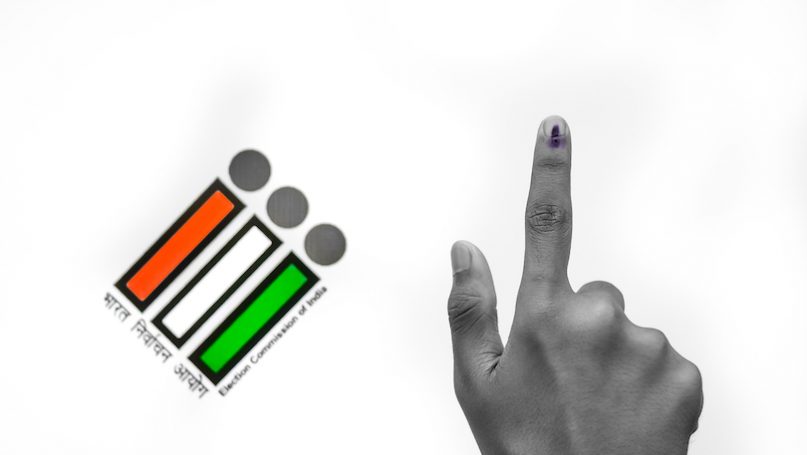
Ever since the implementation of neoliberal reforms in 1991, India has witnessed a drastic change in the internal mechanics of domestic politics. Parties have become ever more homogenous in their ideological outlooks – neoliberal orthodoxy and synthetic secularism now exist across the political spectrum, evident in the widespread cross-pollination between seemingly opposed parties. Instead of listening to and fulfilling the demands of the masses, parties are functioning as administrative agents of the contemporary Indian state. This has entailed the establishment of a very nebulous social basis and programme which incorporates and de-incorporates different politico-cultural idioms based on circumstantial conveniences.
These structural shifts in the arena of Indian politics have rendered elections as a serial process – a process in which a passive collectivity is born whose members’ situational interaction is defined solely by the orientation of diverse existences and actions around a common set of material objects, forces and structures. With the abridgment of political parties to mere regulators of social discontent, voters no longer participate in elections as actively organized citizens. Rather, they become powerless individuals – abstracted from the praxis of the democratic group – whose only involvement in the electoral process consists in confronting the parties as receptacles of reified power.
In “Critique of Dialectical Reason”, the French philosopher Jean-Paul Sartre notes:
[I]n bourgeois democracies, elections are passive, serial processes. Each elector, of course, decides how to vote as Other and through Others; but instead of deciding in common and as a united praxis with the Others, he allows it to be defined inertly and in seriality by opinion… electoral systems constitute the set of electors as a passive material for other-direction.
To translate this into our present-day context, Indian political parties – insofar that they have become quasi-state apparatuses with a high degree of centralization – fabricate serialities that mediate between individuals as Others. Therefore, people don’t vote as practical subjects but rather as Others who are already embedded in an institutional matrix of manipulation.
What does this manipulation consist of? It consists of the over-interpellation of individuals, the constitution of individuals as subjects not by one interpellation, but by multiple and contradictory interpellations. In other words, the individual is embedded in a network of different ideological discourses.
In ‘Elections: A Trap for Fools’, Sartre writes:
[W]hen we are called to vote, I, the Other, have my head stuffed with petrified ideas which the press or television has piled up there. They are serial ideas which are expressed through my vote, but they are not my ideas. The institutions of bourgeois democracy have split me apart: there is me and there are all the Others they tell me I am (a Frenchman, a soldier, a worker, a taxpayer, a citizen, and so on). This splitting-up forces us to live with what psychiatrists call a perpetual identity crisis. Who am I, in the end? An Other identical with all the others, inhabited by these impotent thoughts which come into being everywhere and are not actually thought anywhere? Or am I myself? And who is voting? I do not recognize myself anymore.
The dispersion of Indian citizens into manifold identities generates a state of serial solitude wherein the subaltern possesses a consciousness that is refracted by the prisms of discordant interpellations. The Bharatiya Janta Party (BJP) has won elections by producing a structured combination of relations of subjectivity from this mosaic of historical accretions and ideological distortions. This has been done by allowing sublaterns to deposit their agony and anxiety – episodic and disjointed sediments of cognitive accumulation – into empty spaces of fears, fantasies and pathological hope where grievances can be amplified and semanticized but not solved. Intensification of confusion – through the mythologization and reactive intermixing of temporalities – has become the primary modality of extending hegemony.
The Opposition’s failure to construct a viable counter-narrative against the ruling dispensation derives from its inability to dissever dominant codes of governance from its political strategy. Aijaz Ahmad remarks: “with the exception of the Left, there is no political party, including the Congress, for which the need to fight collectively for secular civility takes precedence over its own sectoral, corporate interest.” Consequently, the BJP’s toxic admixture of religious fanaticism and extreme capitalism has remained untouched. No forceful and dedicated effort is being made to break the shackles of seriality and re-integrate elections with the domain of social struggles.
Verbal rhetoric in favor of the Indian people can’t substitute the development of movements which articulate a new national-popular will. A political identity is not a sociological substance – a misunderstanding manifest in the notion of vote bank. Robustly grounded and socially effective identities start from concrete practices which have the capacity to bring together what subalterns’ singularities have in common.
In “The German Ideology”, Karl Marx and Friedrich Engels comment: “The separate individuals form a class only insofar as they have to carry on a common battle against another class”. Thus, Indian politics needs to reject electoral objectification – the conversion of subalterns into electoral objects that are identical with all the other objects, differing from them only by their serial number. A radical imagination is required which foregrounds the democratic development of citizens.
Further Reading on E-International Relations
- Opinion – The Aam Aadmi Party’s Effect on Indian Politics
- From (Communally-Based) Religion to Secularism in Indian Politics
- Militarization in the Age of the Pandemic Crisis
- Debating the Legacies of James M. Buchanan and Neoliberalism
- Opinion – What does the Sino-Indian Dispute Mean for Nepal?
- Chile and the Overcoming of Neoliberalism: Countering Authoritarianism and the Self-Regulated Market